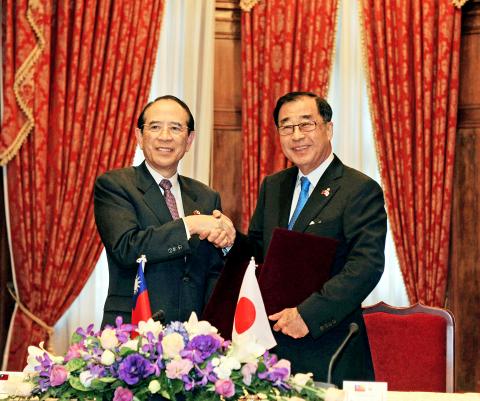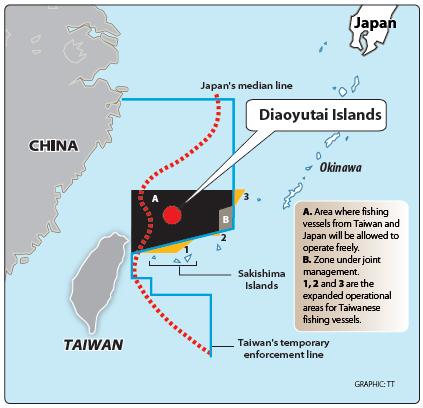Taiwan and Japan yesterday inked a fisheries agreement in a bid to end controversies over fishing in waters surrounding the contested Diaoyutai Islands (釣魚台). The agreement includes an escape clause which Taipei said allows both sides to set aside disputes over their competing sovereignty claims.
The agreement assured Taiwanese vessels an intervention-free fishing zone in waters between 27° north latitude and the Sakishima Islands, Okinawa Prefecture, and gave Taiwan an additional fishing zone of 1,400 square nautical miles (4,800km2) outside Taiwan’s temporary enforcement line, government officials said.
Under the deal, fishing vessels from both countries can operate in a large area within the designated zone without being subject to the jurisdiction of the other side, while a smaller area of the zone, where Japanese fishing vessels frequently operate, is under joint management by the two governments.

Photo: CNA
Provisions under the agreement do not apply to waters within 12 nautical miles — a state’s territorial waters — surrounding the Diaoyutai Islands, because the islands are claimed by both Taiwan and Japan, which calls them the Senkaku Islands.
China also claims sovereignty over the Diaoyutais. Japan and China signed a fisheries agreement in 1997, which took effect in 2000, under which both sides co-manage waters above 27° north latitude.
At the signing ceremony at the Taipei Guest House, Association of East Asian Relations Chairman Liao Liou-yi (廖了以) and Interchange Association, Japan Chairman Mitsuo Ohashi hailed the agreement, which they said marked a big step forward in bilateral relations.

The negotiations yesterday were the 17th round since talks started in August 1996.
Taipei and Tokyo initiated fishery talks following incidents of Taiwanese fishing boats being seized, detained or expelled by the Japan Coast Guard after Tokyo ratified the UN Law of the Sea Treaty in 1996 and set up a 200 nautical mile exclusive economic zone that included waters surrounding the Diaoyutais.
Ohashi said it was “with great pleasure” that the deal was finally signed.
The primary goals were to “maintain peace and stability in East China Sea” and to “strengthen the existing friendly relations with Taiwan,” he said.
At a press conference after the signing ceremony, Minister of Foreign Affairs David Lin (林永樂) said that the agreement did not address the competing claims over the Diaoyutais, as both governments agreed to “set aside the dispute.”
As stated in Article 4, provisions that both sides have agreed to under the deal have no effect on each side’s sovereignty claims over the Diaoyutais, Lin said, adding that the escape clause was written into the agreement at Taipei’s insistence.
"We did not back down one bit over the sovereignty issue in the talks,” Lin said.
Waters within 12 nautical miles surrounding the Diaoyutais were exempted from the agreement because “we insisted that the area is our territorial sea, while Japan upheld its position” that it is theirs, Lin said.
Coast Guard Administration Minister Wang Jinn-wang (王進旺) called on Japanese and Chinese fishing vessels not to operate in waters within the 12 nautical miles surrounding the Diaoyutais and vowed to adopt appropriate measures against Chinese and Japanese fishing vessels to protect the rights of Taiwanese fishermen.
Under the agreement, Taiwan and Japan also agreed to establish a fisheries commission to discuss other issues, including the delineation of overlapping waters in their respective exclusive economic zones above 27º north latitude and waters south of Sakishima Islands, on an annual basis.
Meanwhile, China yesterday expressed concern about the new agreement.
“We are extremely concerned about Japan and Taiwan discussing and signing a fishing agreement,” Chinese Ministry of Foreign Affairs spokesman Hong Lei (洪磊) told a daily news briefing.
“We hope that Japan earnestly abide by its promises on the Taiwan issue and act cautiously and appropriately,” she said.
Additional reporting by Reuters
History of negotiations
‧ First two rounds of negotiations, 1996: Both sides insisted on their respective sovereign claims over the Diaoyutai Islands and did not have substantial discussions about fisheries issues.
‧ Third round of negotiations, 1997: Working-level discussions began about fishing grounds, but delimitation was not discussed.
‧ Fourth, fifth and sixth rounds of negotiations, 1998 to 2000: Taiwan proposed that a commission be set up to co-manage fisheries in the area and that fishing grounds be delimited based on “equitable principle.” Japan rejected the proposals.
‧ Seventh to 15th rounds of negotiations, 2000 to 2005: Taiwan demanded co-management of waters below 27o north latitude and that Taiwanese fishermen have the rights to fish in waters between 27o north latitude to 29o18’ north latitude, because this is within Taiwan’s Exclusive Economic Zone. Japan rejected the proposal and wanted to negotiate based on the principle of a “geographic median line.” It also rejected Taiwan’s claim to fish in waters above 27o north latitude because the area was marked as a zone of joint control between China and Japan in their bilateral fisheries agreement signed in 1997.
‧ Sixteenth round of negotiations, 2009: Consensus was reached on four general principles to deal with disputes on fisheries issues. No substantial discussions on delimitation were held.
Prepared by staff reporter Shih Hsiu-chuan

CHAOS: Iranians took to the streets playing celebratory music after reports of Khamenei’s death on Saturday, while mourners also gathered in Tehran yesterday Iranian Supreme Leader Ayatollah Ali Khamenei was killed in a major attack on Iran launched by Israel and the US, throwing the future of the Islamic republic into doubt and raising the risk of regional instability. Iranian state television and the state-run IRNA news agency announced the 86-year-old’s death early yesterday. US President Donald Trump said it gave Iranians their “greatest chance” to “take back” their country. The announcements came after a joint US and Israeli aerial bombardment that targeted Iranian military and governmental sites. Trump said the “heavy and pinpoint bombing” would continue through the week or as long

TRUST: The KMT said it respected the US’ timing and considerations, and hoped it would continue to honor its commitments to helping Taiwan bolster its defenses and deterrence US President Donald Trump is delaying a multibillion-dollar arms sale to Taiwan to ensure his visit to Beijing is successful, a New York Times report said. The weapons sales package has stalled in the US Department of State, the report said, citing US officials it did not identify. The White House has told agencies not to push forward ahead of Trump’s meeting with Chinese President Xi Jinping (習近平), it said. The two last month held a phone call to discuss trade and geopolitical flashpoints ahead of the summit. Xi raised the Taiwan issue and urged the US to handle arms sales to

State-run CPC Corp, Taiwan (CPC, 台灣中油) yesterday said that it had confirmed on Saturday night with its liquefied natural gas (LNG) and crude oil suppliers that shipments are proceeding as scheduled and that domestic supplies remain unaffected. The CPC yesterday announced the gasoline and diesel prices will rise by NT$0.2 and NT$0.4 per liter, respectively, starting Monday, citing Middle East tensions and blizzards in the eastern United States. CPC also iterated it has been reducing the proportion of crude oil imports from the Middle East and diversifying its supply sources in the past few years in response to geopolitical risks, expanding

Pro-democracy media tycoon Jimmy Lai’s (黎智英) fraud conviction and prison sentence were yesterday overturned by a Hong Kong court, in a surprise legal decision that comes soon after Lai was jailed for 20 years on a separate national security charge. Judges Jeremy Poon (潘兆初), Anthea Pang (彭寶琴) and Derek Pang (彭偉昌) said in the judgement that they allowed the appeal from Lai, and another defendant in the case, to proceed, as a lower court judge had “erred.” “The Court of Appeal gave them leave to appeal against their conviction, allowed their appeals, quashed the convictions and set aside the sentences,” the judges